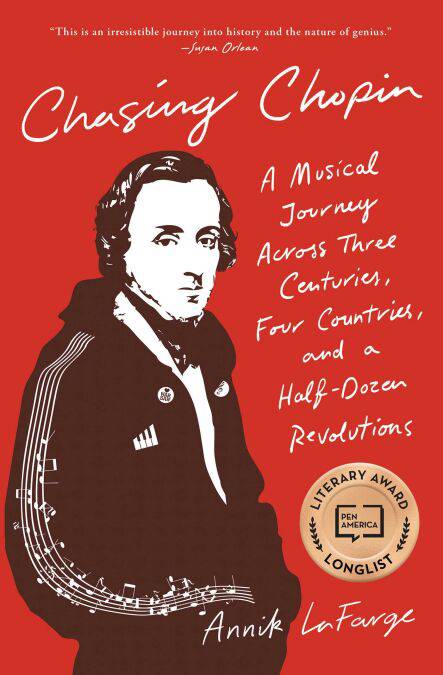
- Afhalen na 1 uur in een winkel met voorraad
- Gratis thuislevering in België vanaf € 30
- Ruim aanbod met 7 miljoen producten
- Afhalen na 1 uur in een winkel met voorraad
- Gratis thuislevering in België vanaf € 30
- Ruim aanbod met 7 miljoen producten
Zoeken
Chasing Chopin E-BOOK
A Musical Journey Across Three Centuries, Four Countries, and a Half-Dozen Revolutions
Annik LaFarge
E-book | Engels
€ 15,65
+ 15 punten
Uitvoering
Omschrijving
A modern take on a classical icon: this “luminous book” (Susan Orlean, New York Times bestselling author of The Library Book) tells the story of when, where, and how Chopin composed his most famous work, uncovering many surprises along the way and showing how his innovative music still animates and thrives in our culture centuries later.
In this widely-praised book, Annik LaFarge presents a very different Frédéric Chopin from the melancholy, sickly, Romantic figure that has predominated for so long. The artist she discovered is, instead, a purely independent—and endlessly relevant—spirit: an innovator who created a new musical language; an autodidact who became a spiritually generous, trailblazing teacher; a stalwart patriot during a time of revolution, pandemic, and exile.
One of America’s foremost pianists, Jeremy Denk, wrote in The New York Times: “It is almost impossible for me to imagine a world in which [Chopin’s “Funeral March”] is both fresh and tragic, where its death is real. LaFarge’s charming and loving new book attempts to recover this world…This book took me into many unexpected corners…For a book about death, it’s bursting with life and lively research.”
In this “entertaining dual music history and memoir” (Publishers Weekly), a “seamless blend of the musical and literary verve” (Kirkus Reviews, starred review) LaFarge “brilliantly traces the footsteps of Chopin’s life” (Scott Yoo, host of PBS Now Hear This) during the three years, 1837–1840, when he composed the now-iconic Funeral March, using its composition story to illuminate the key themes of Chopin’s life.
As part of her research into Chopin’s world, then and now, LaFarge visited piano makers, monuments, churches, and archives; she talked to scholars, jazz musicians, video game makers, music teachers, theater directors, and of course dozens of pianists. She has given us, says pianist, author, and New York Times columnist Michael Kimmelman, “a tour-de-force and journey of the soul.”
It is an engrossing, “impeccably researched” (Library Journal) work of musical discovery and an artful portrayal of a man whose work and life continue to inspire artists and cultural innovators in astonishing ways.
An acclaimed companion website, WhyChopin, presents links to each piece of music mentioned in the book, organized by chapter, along with photos, resources, and more.
In this widely-praised book, Annik LaFarge presents a very different Frédéric Chopin from the melancholy, sickly, Romantic figure that has predominated for so long. The artist she discovered is, instead, a purely independent—and endlessly relevant—spirit: an innovator who created a new musical language; an autodidact who became a spiritually generous, trailblazing teacher; a stalwart patriot during a time of revolution, pandemic, and exile.
One of America’s foremost pianists, Jeremy Denk, wrote in The New York Times: “It is almost impossible for me to imagine a world in which [Chopin’s “Funeral March”] is both fresh and tragic, where its death is real. LaFarge’s charming and loving new book attempts to recover this world…This book took me into many unexpected corners…For a book about death, it’s bursting with life and lively research.”
In this “entertaining dual music history and memoir” (Publishers Weekly), a “seamless blend of the musical and literary verve” (Kirkus Reviews, starred review) LaFarge “brilliantly traces the footsteps of Chopin’s life” (Scott Yoo, host of PBS Now Hear This) during the three years, 1837–1840, when he composed the now-iconic Funeral March, using its composition story to illuminate the key themes of Chopin’s life.
As part of her research into Chopin’s world, then and now, LaFarge visited piano makers, monuments, churches, and archives; she talked to scholars, jazz musicians, video game makers, music teachers, theater directors, and of course dozens of pianists. She has given us, says pianist, author, and New York Times columnist Michael Kimmelman, “a tour-de-force and journey of the soul.”
It is an engrossing, “impeccably researched” (Library Journal) work of musical discovery and an artful portrayal of a man whose work and life continue to inspire artists and cultural innovators in astonishing ways.
An acclaimed companion website, WhyChopin, presents links to each piece of music mentioned in the book, organized by chapter, along with photos, resources, and more.
Specificaties
Betrokkenen
- Auteur(s):
- Uitgeverij:
Inhoud
- Aantal bladzijden:
- 240
- Taal:
- Engels
Eigenschappen
- Productcode (EAN):
- 9781501188732
- Verschijningsdatum:
- 10/08/2020
- Uitvoering:
- E-book
- Beveiligd met:
- Adobe DRM
- Formaat:
- ePub

Alleen bij Standaard Boekhandel
+ 15 punten op je klantenkaart van Standaard Boekhandel
Beoordelingen
We publiceren alleen reviews die voldoen aan de voorwaarden voor reviews. Bekijk onze voorwaarden voor reviews.







